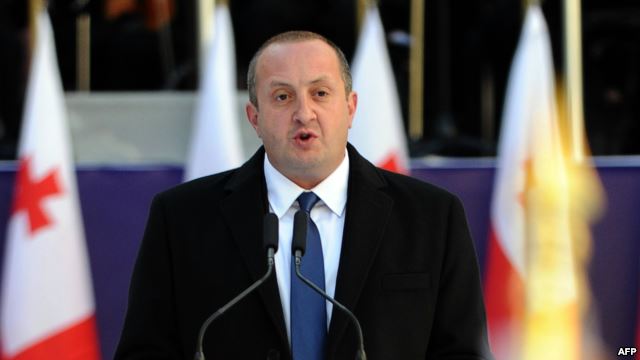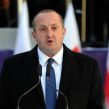
Georgian Government Plays an Unattainable Foreign Policy Game
Publication: Eurasia Daily Monitor Volume: 11 Issue: 34
By:

On February 10, when asked by a Georgian journalist if he would meet with the president of Georgia, Russian President Vladimir Putin uttered: “Yes, if he wants, why not?” (civil.ge, February 10). Putin’s words caused an outburst of thinly-veiled euphoria in the Georgian leadership. President Giorgi Margvelashvili quickly replied, stating that he would thoroughly consider the Russian head of state’s remarks (newspress.ge, February 10). Later, Margvelashvili elaborated that Georgia was ready for a “rational discussion” with Russia (Rustavi 2 TV, February 14). Moreover, Georgian Prime Minister Irakli Garibashvili weighed in by noting that he was ready for a meeting with Putin (Imedi TV, February 11).
A week earlier, however, on February 5, forty United States Congressmen had sent a letter to US Secretary of State John Kerry, urging him to make enlargement a priority for the upcoming September 2014 summit of the North Atlantic Treaty Organization, set to take place in the United Kingdom. Their letter openly advocated granting a Membership Action Plan (MAP) to Georgia (https://www.civil.ge/files/files/2014/Letter-Congress-NATO-Kerry.pdf). Though President Margvelashvili welcomed the letter (tabula.ge, February 10), Prime Minister Garibashvili has not expressed any opinion about it to date. Whereas, on February 16, Garibashvili stated that whether Georgia will receive MAP now or later does not have critical importance, as Georgia’s pro-Western foreign policy course would not be altered (Channel 1, Imedi TV, Rustavi 2 TV, January 16). Furthermore, parliamentary speaker David Usupashvili expressed hope that this year would bring some progress regarding Georgia’s NATO integration process (news.ge, February 11).
The above-cited official reactions to the Russian president’s and the US Congressmen’s statements clearly display the current Georgian government’s foreign policy strategy: while desperately trying to improve relations with Russia, Tbilisi is simultaneously paying lip service to Georgia’s aspirations for NATO membership.
Whether or not the Georgian foreign policy strategy represents simple naiveté on the part of the Georgian Dream government, the fact remains that that rapprochement with Russia excludes the very notion of Georgia’s NATO membership. For the Kremlin, the post-Soviet space remains an area of geopolitical zero-sum games—Russia’s relations with other states in this region can either result in winning everything or nothing. It is therefore naïve, if not outright dangerous, for the Georgian government to believe that it will be able to normalize relations with Moscow, while keeping Georgia on track to eventually secure NATO membership. The Kremlin has made it clear on numerous occasions that it will not tolerate the North Atlantic Alliance’s expansion into the post-Soviet space, including in Georgia, and will do everything in Russia’s capacity to halt it. Hence, Russia is most likely to use its ongoing negotiations with Georgia to disrupt the country’s progress toward NATO integration.
Already, signs are beginning to appear in relation to this. Reportedly, military experts and political analysts in Russia are currently discussing the possibility of establishing a joint Russian-Georgian anti-terrorist center, either in the port city of Batumi in southwestern Georgia or in Pankisi Gorge in the country’s northwest, adjacent to Chechnya (frontnews.ge, February 4). Such a center (or centers), would allow Russia to penetrate Georgian military and security services and, subsequently, would enable it to entrench its military presence in the rest of Georgia still not occupied by Russian forces. Logically, Moscow’s further military entrenchment in Georgia would delay, if not finally derail entirely, Tbilisi’s already remote prospects for joining NATO.
Meanwhile, there are signs that the Georgian government has become more timid, and even self-damaging, in defending the country’s territorial integrity while dealing with Russia. For instance, on February 7, during the opening ceremony of the Sochi Winter Olympics, the satellite image of Georgia showed the breakaway regions of Abkhazia and South Ossetia deliberately covered by clouds. Georgian Foreign Minister Maia Panjikidze stated that she did not see any kind of provocation in this act (epn.ge, February 7). Furthermore, Abkhazian and South Ossetian separatist leaders Alexander Ankvab and Leonid Tibilov, respectively, officially met together in Sochi on February 8 and also held talks with Leonid Slutsky, the chairman of Russia’s State Duma committee on Commonwealth of Independent States (CIS) and Eurasian integration. Minister Panjikidze once again stated that there was no need for an official reaction to this fact (civil.ge, February 8).
The Georgian government continuously praises itself for adopting a diplomatic tone in its relations with Moscow. However, its diplomatic tone increasingly resembles turning a blind eye to the deliberate violations of Georgia’s sovereignty by Russia. Increasingly, there are clear signs that the Russian-Georgian talks do not represent an innocuous dialogue between the two countries to improve relations. Rather, it appears that they are a dangerous game, which may badly hurt Georgia in the short, medium, and long term.




